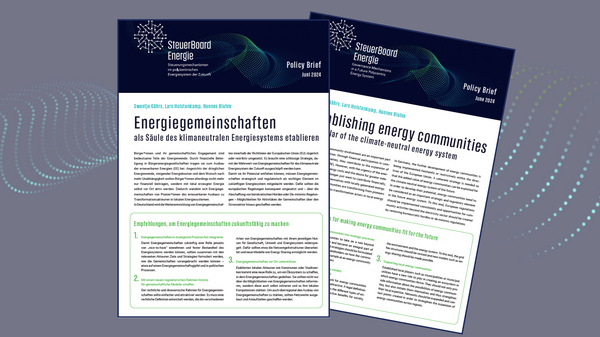
Joint press release by the Institute for Ecological Economy Research (IÖW), the Institute for Sustainability Governance (INSUGO) at Leuphana University Lüneburg and the ECOLOG-Institute for Social-Ecological Research and Education
Promoting energy communities: What policymakers should do now

- Energy communities do a lot for the energy transition: They promote acceptance, secure financing, enable stability and impart knowledge
- Analysis by the Institute for Ecological Economy Research (IÖW) and Leuphana University Lüneburg shows how policymakers and administrations can better promote community-based energy supply models
- An overarching strategy is needed that establishes energy communities as a pillar of the energy system and creates a regulatory framework for them
Berlin/Lüneburg, July 2, 2024 – Thousands of citizens are committed to the energy transition locally. They are part of energy communities and invest in locally generated renewable energy. In a recent policy paper, researchers from the Institute for Ecological Economy Research (IÖW), Leuphana University Lüneburg and the Ecolog Institute demonstrate the high relevance of the energy transition from the bottom up and point out that the potential is much greater than has been exploited to date.They recommend that politicians create clear funding conditions, provide citizens with better information and reduce hurdles and bureaucracy. This is the only way to meet the European Union's targets: These stipulate that at least one energy community should be established in every town with more than 10,000 inhabitants.
Regulatory framework and opportunities for energy communities still a patchwork quilt
It is estimated that there are around 2,500 to 3,000 energy communities in Germany. In addition to a low-cost energy supply, their members also enjoy social benefits such as the transfer of knowledge about the energy transition or the strengthening of their local community. Energy policy and the energy system also benefit: Energy communities promote local acceptance of the energy transition and help finance the switch to wind or solar energy. Although studies attribute a high potential to energy communities across Europe, the development of participatory models in Germany has been slow.
“For the federal government, energy communities have not yet taken center stage when it comes to shaping the climate-neutral energy system of the future. Most recently, impetus has mainly come from the federal states or the European Union”, emphasizes energy expert Swantje Gährs from the IÖW. “With the solar package that came into force in May 2024, the German government has taken the first steps, but new energy community models such as energy sharing, in which participants not only invest in energy systems but also use the energy collectively, are still not possible under the current regulatory framework. We recommend that federal policymakers and the federal administration leverage the potential of energy communities for the implementation and acceptance of the energy transition. As energy communities can be implemented in both the electricity and heating sectors, the majority of citizens could potentially participate in and benefit from energy communities.”
Necessary now: Establish a strategy, value commitment and reduce bureaucracy
With an analysis of current political processes and lessons learned from research on commons, the researchers show that an overarching strategy is needed at federal level. This should both set quantitative targets for energy communities and create a framework in which community models can develop further. An energy community summit can be a suitable space to discuss goals and strategy together with all stakeholders. “Politicians have been too slow and hesitant to change the regulatory framework in particular. More courage is needed to establish energy communities as a pillar of the energy system and to signal to citizens that their participation and involvement in the energy transition is desired and necessary”, explains economist Lars Holstenkamp from Leuphana University Lüneburg. Bureaucratic hurdles and complex framework conditions are currently limiting community involvement.
In order to make the models even more widespread, the researchers are calling for neutral information points, such as those that already exist in Austria. Local cooperation between established players such as municipal utilities and community models run by citizens should also be promoted. In this way, energy communities could not only be an opportunity for citizens to participate in the energy transition – the transformation of the energy system as a whole can also benefit from acceptance, stability and financing.
About the project
Swantje Gährs from the IÖW and Lars Holstenkamp from Leuphana University Lüneburg and the Ecolog Institute lead the junior research group “SteuerBoard Energie”, which is funded by the Federal Ministry of Education and Research as part of the Social-Ecological Research. Here, four doctoral students are conducting research together with the management on the question of what governance energy communities need in order to develop their potential. The focus is on specific models such as energy sharing or pooling of storage facilities and their socio-economic and ecological impact. They also examine the governance of energy communities in all European member states and their influence on transformation paths.
~~~~~~~~~~~~~~~~~~~~~~~
Further information:
- Download Policy Brief: Establishing energy communities as a pillar of the climate-neutral energy system (PDF, 5 MB)
- About the project: https://www.steuerboard-energie.org/english/
Expert contacts:
Expert contacts:
Dr. Swantje Gährs
Institute for Ecological Economy Research
Phone: + 49 30/884 594-0
E-mail: swantje.gaehrs(at)ioew.de
Dr. Lars Holstenkamp
Leuphana University of Lüneburg
Phone: +49 4131/677-1931
E-mail: lars.holstenkamp(at)leuphana.de
Press contact:
Richard Harnisch
Institute for Ecological Economy Research (IÖW)
Phone: +49 30/884 594-16
E-mail: kommunikation(at)ioew.de
About us
The Institute for Ecological Economy Research (IÖW) is a leading scientific institute in the field of practice-oriented sustainability research. About 70 employees develop strategies and approaches for a sustainable economy – for an economy that enables a good life and preserves the natural foundations. The institute operates on a non-profit basis and without basic public funding. The IÖW is a member of the “Ecological Research Network” (Ecornet), the network of non-university, non-profit environmental and sustainability research institutes in Germany.
www.ioew.de | Twitter (X) | LinkedIn | Mastodon | Bluesky | Newsletter
The Institute for Sustainability Governance (INSUGO) is part of the Faculty of Sustainability at Leuphana University Lüneburg. At the heart of the activities of the staff of the Institute for Sustainability Governance is the question: Which public institutions and regulatory systems can achieve the normative goal of sustainability in a complex and pluralistic society? This question is answered through scientific research, academic teaching and practice transfer on topics of public sustainability management.
www.leuphana.de/institute/insugo.html
The ECOLOG-Institute for Social-Ecological Research and Education is an interdisciplinary research institution that accompanies and supports the social process of transition to sustainable development through scientific analysis, advice and education. The ECOLOG Institute has locations in Lüneburg and Bugewitz near Greifswald.

